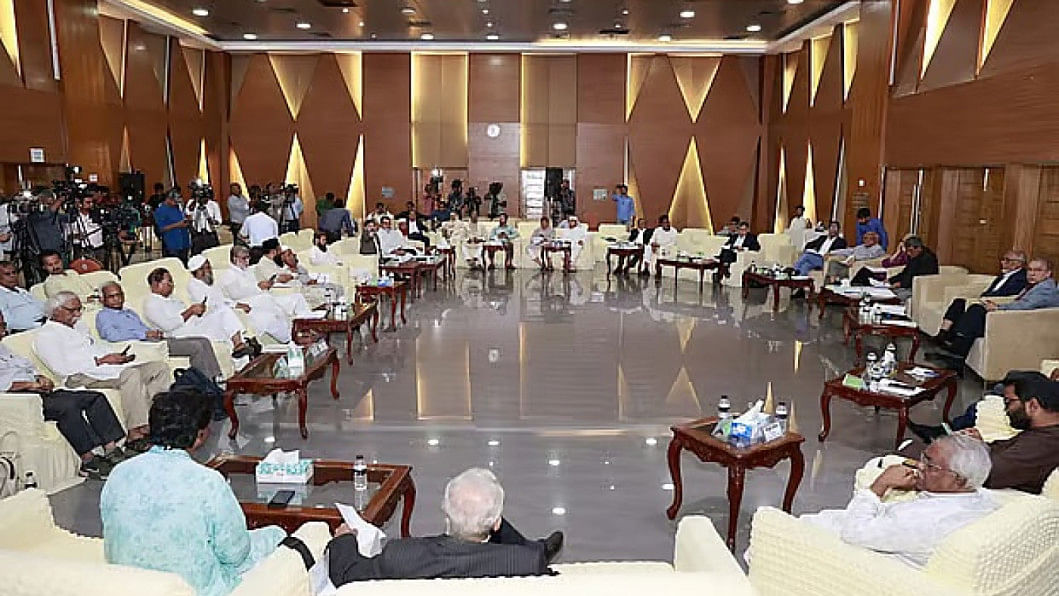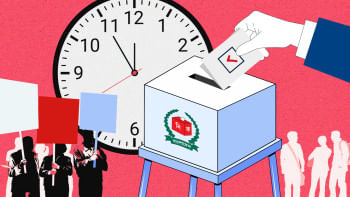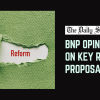Kudos for consensus in some vital areas

There is enough good news coming out of the National Consensus Commission's (NCC) deliberations to feel cheerful after months of frustrations. As of 7:30pm on Thursday, consensus has been achieved in 16 areas, some of which are extremely significant. Some parties gave the note of dissent, but did not oppose. After 44 meetings with 32 political parties and alliances from March 20 to May 19 and 23 meetings with 30 political parties from June 2 to July 31, the NCC has been able to produce some significant results which, if the political parties don't shift from their commitment, could change the course of our political history and culture.
One of the most significant consensus deals is the approval of the formation of the upper house in parliament through proportional votes received by parties during the election of the lower house. This is likely to bring about a qualitative change in the functioning of our parliament and in our political debates, hopefully moving towards sobriety and in-depth analysis, replacing unabashed sycophancy and cheap rhetoric.
The 10-year time limit for an individual serving as the prime minister is a sign of true negotiation and genuine "give and take" among the political parties. Reaching a consensus on this point is something totally contrary to our political culture, especially as it affects the future of the de-facto party chief. Though the BNP accepted it with a note of dissent, it was a mature concession and hence deserves our praise.
The consensus reached on the election of the president is another milestone achieved by the NCC. Over the years, the election of the president, which in reality was selection by the prime minister, became more and more arbitrary and sometimes whimsical, epitomised by the election of President Mohammed Shahabuddin who said on TV that he did not know as he was never even asked. We also recall how President Baddruddoza Chowdhury was forced to resign from his office because the prime minister had wished so. So we desperately need to institutionalise the election to the position of the head of the state. As we have agreed to curtail the prime minister's power and share some of it with the president, his or her election must be a transparent and morally acceptable process.
The other issues on which a consensus has been reached include: a change in Article 70 of the constitution to allow MPs to vote freely except on no-confidence motion and finance bills; providing for the opposition to get the position of the chair of four important standing committees; demarcation of constituencies; guidelines for the president's pardoning power; decentralising the High Court; process of appointment of the chief justice; process of selecting the Election Commission to be incorporated in the constitution; setting up an independent police commission to create a people-friendly and accountable police force; separating the prime minister's and party chief's positions, which cannot be held by the same person; and agreeing to appoint the deputy speaker from the opposition. The parties that disagreed gave a note of dissent.
However, a crucial issue on which consensus has been reached is setting up a permanent independent commission for the police, that vital state institution whose gross misuse by Sheikh Hasina led to at least 1,400 deaths and thousands more injured. Police is one of the most important institutions of the state, whose quality service has the potential to change the lives of ordinary people, but whose malfunctioning on many fronts has made it a threat to public safety and peace.
Bringing the police under an independent commission will help prevent its abuse by the political powerholders of the day. Will our political parties respect this decision after winning the next election? We have deep-seated reasons to feel uncertain. Resistance against constituting an independent police commission may come from the home ministry's secretariat as bureaucrats are always averse to losing power. But an independent commission, which will be forward-looking, transparent and accountable to the public and parliament, will have a huge positive impact on our police force as well as the general public.
The disappointing part, however, is the consensus reached on women's seats. The provision of 50 reserved seats remains as before, with a new agreement that five percent of the candidates of a party's total candidates nominated to contest an election will have to be women.
In real terms, it means nothing. Without the provision that there will be specific women-only constituencies, women candidates will have to fight with male contestants, which traditionally results in the victory of the latter. In the overall seat calculation, knowing the likely results, all political parties, especially the big ones, will choose female candidates where they are the weakest.
This is the biggest injustice that is being done against women in spite of their unquestioned sacrifice and massive and effective participation in the July mass uprising. In this new Bangladesh—"Notun Bondobosto"—there is nothing new for women's representation in parliament. It must also be noted that all political party representatives in the NCC's dialogue sessions were men, and the NCC itself had no women members. There were one or two women who participated, but only for a while. So about 50 percent of the country's voters had practically no representation in formulating our reforms. The Women's Affairs Reform Commission was perhaps the most vilified of the reform commissions, and its recommendations have all but been ignored. If the coming election marks the beginning of our new democratic journey, then it will begin with very few voices of women having been heard.
There are two ironies here. First, during the last three decades of our politics, we had an unbroken rule by two powerful women leaders: Khaleda Zia and Sheikh Hasina. Yet, women's rights remain unrealised and their contribution fundamentally unrecognised in the country.
The second irony is that Chief Adviser Prof Muhammad Yunus, whose pioneering microcredit system won global fame and recognition and the Nobel Peace Prize for him and his institution, and who was almost completely focused on women's real empowerment, now heads a reform process that has so little participation of women and even fewer prospective results for them.
In our view, there are two fundamental reasons why consensus could not be reached on some vital points: a) desire to maintain unbridled power for the executive branch over the legislative and judiciary; and b) the nature and history of our political culture.
From the very start, in 1972, of the three branches of the government, the executive branch always enjoyed more power. It started with Bangabandhu Sheikh Mujibur Rahman, whose overwhelming stature dwarfed every other body regardless of how powerful they constitutionally were. From the president, speaker of the House, chief justice and chief whip, to every other person of position, however powerful, naturally revered Sheikh Mujib and never asserted themselves even when they had the legal and moral grounds to do so. The executive branch stood above the other two. Then with the military intervention, the concentration of power in the hands of the executive branch continued throughout the tenure of Gen Ziaur Rahman and Gen HM Ershad. When democracy was restored, the emergence of Khaleda Zia and Sheikh Hasina as bigger-than-life figures carried on the tradition of powerful leaders, leading the executive branch and minimising the role and importance of the two others.
Needless to say, that trend took diabolical proportions during the Sheikh Hasina regime.
To restore the power balance in our constitution, we need to trim the prime minister's power. That is why the demand that the same person cannot be allowed to hold both the posts of the head of government and head of the ruling party is so important. This power must be split. Otherwise, dominance of the executive branch over the legislative will never cease and the division of power and the practice of checks and balances will never come into play in Bangladesh.
The executive branch's hold over the judiciary, exercised through the law ministry over the years, has crippled the latter. And instead of independent judges, we have ended up with gutless appeasers. The biggest example of this is the way former Chief Justice SK Sinha was literally driven out—first from the court, then from the country.
Thus, we see the prospective ruling party, namely the BNP, trying its best to maintain as many of the old ways as possible so that the executive branch does not have to face accountability from the judiciary as the present constitution envisages.
The other serious issue is that of political culture. Whatever constitutional, structural, procedural and legal reforms we institute, if they are not accompanied with a change in our political culture and of our mindset, then the prospect of positive change—towards democracy, good governance, accountability, transparency, etc—will be very dim indeed.
A topic that did not receive sufficient attention during the reform dialogues is the autocratic nature of the inner workings of our political parties, the concentration of power in the hands of the party head, and the arbitrariness and lack of accountability in using that power, which make our political parties totally undemocratic. Whatever may be said in the party constitution, in reality, total power is always exercised by the party chief. The constitution of the Awami League had many decision-making tiers, but lower-tier leaders would meet and "decide" to "request" the party chief to make all decisions, especially selecting people for virtually all posts which were supposed to be elected.
The BNP's constitution gives all powers to the chief without any restraint, including the power to dismiss all committees at all levels, even if elected as per party rules.
The question arises: how can undemocratic institutions implement democracy when in power? Therefore, the political party culture has to change, and their internal operations must become more democratic and accountable. Lower-tier party leaders must have a voice and power.
If our political culture is to change, the functioning of our political parties must change dramatically. So as we celebrate the success of the National Consensus Commission and congratulate the political parties for reaching consensus on vital issues, strong doubts remain as to how they will behave once elected to power. We have witnessed, over and over again, a political party's transformation once in power.
Mahfuz Anam is the editor and publisher of The Daily Star.
Follow The Daily Star Opinion on Facebook for the latest opinions, commentaries and analyses by experts and professionals. To contribute your article or letter to The Daily Star Opinion, see our guidelines for submission.

 For all latest news, follow The Daily Star's Google News channel.
For all latest news, follow The Daily Star's Google News channel. 











Comments